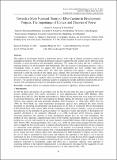Towards a more nuanced theory of elite capture in development projects. The importance of context and theories of power
Abstract
Elite capture in development projects is problematic across a wide range of cultures, governance contexts and geographical locations. The dominant development discourse suggests that elite capture can be addressed using principles of good governance and participatory democracy. We critique the notion that this is sufficient to challenge practices of elite domination that detrimentally affect the outcome of development projects. Using a Foucauldian notion of power we suggest that power relationships are more complex than current conceptualisations of elite capture allow. We offer some definitions and suggest a common conceptual framework to unify the concept of elite capture across cultures. This conceptual framework is used to analyse data from 2 case studies in south western Zambia. We conclude that the dominant discourse ignores complex power relationships and uses a simplistic notion of political legitimacy that may enhance elite capture rather than prevent it. The concept of political legitimacy needs to be expanded to include traditional institutions that are not elected, while still applying principles of participation and accountability to the design of institutions.
Citation
Musgrave , M K & Wong , S 2016 , ' Towards a more nuanced theory of elite capture in development projects. The importance of context and theories of power ' , Journal of Sustainable Development , vol. 9 , no. 3 . https://doi.org/10.5539/jsd.v9n3p87
Publication
Journal of Sustainable Development
Status
Peer reviewed
ISSN
1913-9063Type
Journal article
Rights
Copyright 2016 the authors. This is an open-access article distributed under the terms and conditions of the Creative Commons Attribution license (http://creativecommons.org/licenses/by/3.0/).
Collections
Items in the St Andrews Research Repository are protected by copyright, with all rights reserved, unless otherwise indicated.

